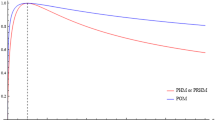Abstract
This paper introduces a generalization of overlap functions by extending one of the boundary conditions of its definition. More specifically, instead of requiring that “the considered function is equal to zero if and only if some of the inputs is equal to zero”, we allow the range in which some t-norm is zero. We call such generalization by a t-overlap function with respect to such t-norm. Then we analyze the main properties of t-overlap function and introduce some construction methods.
Access this chapter
Tax calculation will be finalised at checkout
Purchases are for personal use only
Similar content being viewed by others
Notes
- 1.
In this paper, a increasing (decreasing) function does not need to be strictly increasing (decreasing).
References
Bedregal, B.C., Dimuro, G.P., Bustince, H., Barrenechea, E.: New results on overlap and grouping functions. Inf. Sci. 249, 148–170 (2013)
Bedregal, B.C., Dimuro, G.P., Santiago, R.H.N., Reiser, R.H.S.: On interval fuzzy S-implications. Inf. Sci. 180(8), 1373–1389 (2010)
Beliakov, G., Pradera, A., Calvo, T.: Aggregation Functions: A Guide for Practitioners. Springer, Berlin (2007). https://doi.org/10.1007/978-3-540-73721-6
Bustince, H., Fernandez, J., Mesiar, R., Montero, J., Orduna, R.: Overlap functions. Nonlinear Anal. Theory Methods Appl. 72(3–4), 1488–1499 (2010)
Dimuro, G.P.: On interval fuzzy numbers. In: 2011 Workshop-School on Theoretical Computer Science, WEIT 2011, pp. 3–8. IEEE, Los Alamitos (2011)
Dimuro, G.P., Bedregal, B.C., Reiser, R.H.S., Santiago, R.H.N.: Interval additive generators of interval t-norms. In: Hodges, W., de Queiroz, R. (eds.) WoLLIC 2008. LNCS (LNAI), vol. 5110, pp. 123–135. Springer, Heidelberg (2008). https://doi.org/10.1007/978-3-540-69937-8_12
Dimuro, G.P., Bedregal, B.: Archimedean overlap functions: the ordinal sum and the cancellation, idempotency and limiting properties. Fuzzy Sets Syst. 252, 39–54 (2014)
Dimuro, G.P., Bedregal, B.: On residual implications derived from overlap functions. Inf. Sci. 312, 78–88 (2015)
Dimuro, G.P., Bedregal, B., Bustince, H., Asiáin, M.J., Mesiar, R.: On additive generators of overlap functions. Fuzzy Sets Syst. 287, 76–96 (2016). Theme: Aggregation Operations
Dimuro, G.P., Bedregal, B., Bustince, H., Jurio, A., Baczyński, M., Miś, K.: QL-operations and QL-implication functions constructed from tuples (O, G, N) and the generation of fuzzy subsethood and entropy measures. Int. J. Approx. Reason. 82, 170–192 (2017)
Garcia-Jimenez, S., Bustince, H., Hüllermeier, E., Mesiar, R., Pal, N.R., Pradera, A.: Overlap indices: construction of and application to interpolative fuzzy systems. IEEE Trans. Fuzzy Syst. 23(4), 1259–1273 (2015)
Jurio, A., Bustince, H., Pagola, M., Pradera, A., Yager, R.: Some properties of overlap and grouping functions and their application to image thresholding. Fuzzy Sets Syst. 229, 69–90 (2013)
Lucca, G., Dimuro, G.P., Mattos, V., Bedregal, B., Bustince, H., Sanz, J.A.: A family of Choquet-based non-associative aggregation functions for application in fuzzy rule-based classification systems. In: 2015 IEEE International Conference on Fuzzy Systems (FUZZ-IEEE), pp. 1–8. IEEE, Los Alamitos (2015)
Lucca, G., Sanz, J.A., Dimuro, G.P., Bedregal, B., Asiain, M.J., Elkano, M., Bustince, H.: CC-integrals: Choquet-like copula-based aggregation functions and its application in fuzzy rule-based classification systems. Knowl.-Based Syst. 119, 32–43 (2017)
Mayor, G., Trillas, E.: On the representation of some aggregation functions. In: Proceedings of IEEE International Symposium on Multiple-Valued Logic, pp. 111–114. IEEE, Los Alamitos (1986)
Acknowledgment
Supported by Caixa and Fundación Caja Navarra of Spain, the Brazilian National Counsel of Technological and Scientific Development CNPq (Proc. 307781/2016-0), the Spanish Ministry of Science and Technology (TIN2016-77356-P).
Author information
Authors and Affiliations
Corresponding author
Editor information
Editors and Affiliations
Rights and permissions
Copyright information
© 2018 Springer International Publishing AG, part of Springer Nature
About this paper
Cite this paper
Zapata, H., Dimuro, G.P., Fernández, J., Bustince, H. (2018). T-Overlap Functions: A Generalization of Bivariate Overlap Functions by t-Norms. In: Medina, J., et al. Information Processing and Management of Uncertainty in Knowledge-Based Systems. Theory and Foundations. IPMU 2018. Communications in Computer and Information Science, vol 853. Springer, Cham. https://doi.org/10.1007/978-3-319-91473-2_41
Download citation
DOI: https://doi.org/10.1007/978-3-319-91473-2_41
Published:
Publisher Name: Springer, Cham
Print ISBN: 978-3-319-91472-5
Online ISBN: 978-3-319-91473-2
eBook Packages: Computer ScienceComputer Science (R0)




